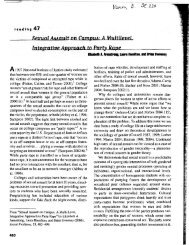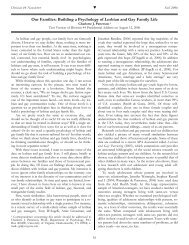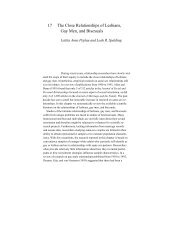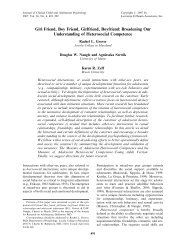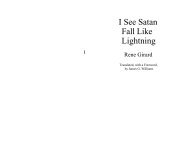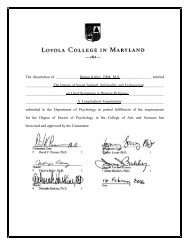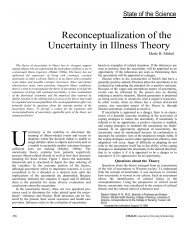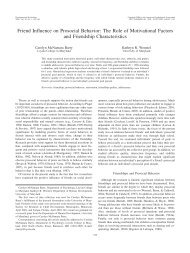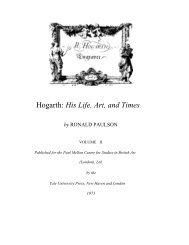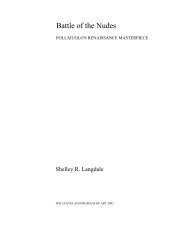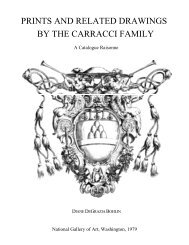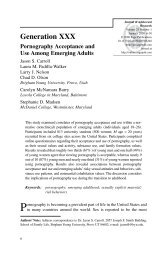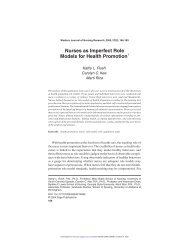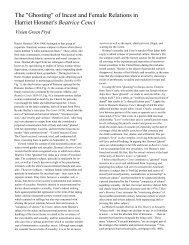The Social Explorer as Anthropologist: Victorian Travellers among ...
The Social Explorer as Anthropologist: Victorian Travellers among ...
The Social Explorer as Anthropologist: Victorian Travellers among ...
You also want an ePaper? Increase the reach of your titles
YUMPU automatically turns print PDFs into web optimized ePapers that Google loves.
the rhetorical strategies I have already discussed, but he chose<br />
to adopt the persona of the anthropologist.<br />
Mayhew, a satirist, journalist, amateur actor, and member<br />
of the literary bohemia of the 1830s and 1840s (of which<br />
Dickens and George Cruikshank were also a part), w<strong>as</strong> <strong>as</strong>ked<br />
to undertake a series of articles on the conditions of the<br />
London working poor for the Morning Chronicle in 1849. <strong>The</strong><br />
Chronicle appointed a number of journalists to cover various<br />
industrial cities throughout England, and Mayhew w<strong>as</strong> made<br />
"Special Correspondent from the Metropolis." 11 <strong>The</strong> paper,<br />
which had liberal, reformist leanings, responded to the grow-<br />
ing middle-cl<strong>as</strong>s interest in problems of poverty and urban<br />
life in general. <strong>The</strong> cholera epidemic of 1849, which claimed<br />
the lives of the urban poor in far greater numbers than the<br />
rest of the population, served to focus even greater attention<br />
on the social issues already brought to public consciousness<br />
by the Depression of the early 1840s, by the Chartist Move-<br />
ment, and by the publication in 1842 of Edwin Chadwick's<br />
Poor Law Commission report on the sanitary conditions af-<br />
fecting the urban poor. <strong>The</strong> middle cl<strong>as</strong>s reacted to these<br />
phenomenon of the decade with fear of social unrest, with<br />
some me<strong>as</strong>ure of repugnance, and with an often hesitant<br />
desire for reform.<br />
Mayhew continued to publish his "letters" from the Me-<br />
tropolis in the Chronicle for just over a year until, in December<br />
of 1850, he broke with the paper and began to issue articles<br />
from an office of his own in twopenny weekly parts. In 1851-<br />
52 the pieces were bound together for publication <strong>as</strong> London<br />
Labour and the London Poor, and a four-volume edition w<strong>as</strong><br />
re-issued in 1861-62. In the Preface to the bound volumes<br />
Mayhew identified himself <strong>as</strong> a "traveller in the undiscovered<br />
country of the poor," who will supply information "concern-<br />
ing a large body of persons of whom the public had less<br />
knowledge than of the most distant tribes of the earth." 12<br />
<strong>The</strong>se remarks, <strong>as</strong> should by now be obvious, are not unusual<br />
and do not distinguish Mayhew from the other "travellers"<br />
who wished to capture the imaginations and sympathies of<br />
their readers. But, <strong>as</strong> we shall see, Mayhew w<strong>as</strong> after more<br />
than sympathy: he wanted to alter the conventional judg-<br />
128



